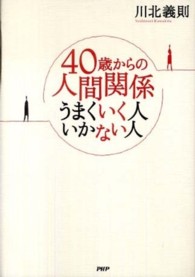- ホーム
- > 洋書
- > 英文書
- > Business / Economics
Full Description
Digitalization is changing the world of work. Technology is shifting the relationship between workers and machines and how work is organized; new skills are becoming increasingly relevant in the workplace where workers no longer work for a single company, in 9-to-5 jobs, five days a week.
Industry 4.0, also known as the Fourth Industrial Revolution, is revolutionizing the way managers can design, control and improve their activities. While the nature of the tasks and the interdependences between individuals are changing, the impact of intelligent technologies is severely questioning the span of control of leaders and the effectiveness of their leadership styles.
The authors sketch out the main changes occurring in the business landscape and identify the new expectations that organizations are formulating for leaders across several industries. In an age in which new leadership models are about to emerge, they describe how the relevant changes impact and shape the managerial arena.
This book sets the stage for a new way of thinking on the nature of the relationship between HR and technology. It examines the influence of Industry 4.0 and Innovation 4.0, (i.e. the connection between physical and digital processes in industrial production, where human competencies and machine potential are strictly interconnected throughout the entire value chain), from a myriad of viewpoints: namely in terms of structures, practices, influences (learning, training and communication), competencies and roles. A chapter is also dedicated to the understanding of the impact of Innovation 4.0, in the context of European Universities through E-learning Experiences where a multiple-case study analysis is provided.
Contents
Part 1: Overview 1. Unlocking the IoT Potential in Manufacturing: an Organizational Analysis and Research Agenda 2. The Case of Corporate Entrepreneurship within Italian SMEs 3. HRM 4.0: the Digital Transformation of the HR Department Part 2: Practices 4. How Technology Has Redefined Human Resource Practices? Understanding the Use of Smart Working 5. Work Autonomy, Control and Discretion in Industry 4.0 6. Work Control and Surveillance in the Age of Digital 7. The Future Role of Machine Learning in HR Development Part 3: Leverages 8. Individual Versus Organizational Learning for Knowledge in Innovation 4.0 Era 9. The Digital Transformation of Learning. Implications for Organizational Training 10. Social Media Strategy within Organizational Communication: Major Open Issues and Challenges Part 4: Competencies and Roles 11. Digital Revolution Equals Digital Competencies? What We Expect For Workers' Competencies in Industry 4.0 12. Digitalization and HR Analytics: a Big Game for an HR Manager 13. Industry 4.0 and the Emerging Challenges to Leadership Part 5: Institutions 14. E-Learning Experiences in European Universities: a Multiple Case Study Analysis 15. Strategic Decision-Making Process in RM Practicies: Data Analysis as Innovative Tool to Prevent Corruption








